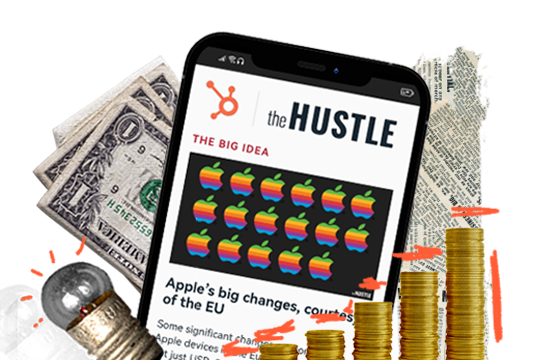- The Modern Warfare
- Posts
- Elon Musk: The Kingmaker in U.S.-China Tensions - Is His Crown Too Heavy?
Elon Musk: The Kingmaker in U.S.-China Tensions - Is His Crown Too Heavy?
Unraveling the Intricate Web of Business, Politics, and National Security
Paying the bills
Our newsletter is powered by beehiiv, which partners with trustworthy and high-quality advertisers.
Ready to level up your work with AI?
HubSpot’s free guide to using ChatGPT at work is your new cheat code to go from working hard to hardly working
HubSpot’s guide will teach you:
How to prompt like a pro
How to integrate AI in your personal workflow
Over 100+ useful prompt ideas
All in order to help you unleash the power of AI for a more efficient, impactful professional life.
Today’s partners
Links We Like
The lack of funding for critical infrastructure in LA sits against the following backdrop:
The State’s revenues are staggering yet our infrastructure is crumbling, new housing is unaffordable and nonexistent, crime is rampant, schools are mediocre and companies are fleeing in… x.com/i/web/status/1…
— Chamath Palihapitiya (@chamath)
2:25 AM • Jan 13, 2025
"I can't get enough sleep" is not a problem; it is a potential cause (or perhaps the result) of a problem. To clarify your thinking, try to identify the bad outcome first; e.g., "I am performing poorly in my job." Not sleeping enough may be the cause of that problem, or the cause… x.com/i/web/status/1…
— Ray Dalio (@RayDalio)
4:43 PM • Jan 12, 2025
Navigating Complex Alliances: Elon Musk’s Role in U.S.-China Relations and National Security Concerns
Elon Musk’s rising influence within the political and business landscapes has placed him at the intersection of crucial geopolitical tensions, particularly between the United States and China. Musk’s connection to both President Donald Trump and China’s leadership has sparked discussions on the potential implications of his business interests for U.S. foreign policy and national security. As tensions between the two nations continue to escalate, Musk’s role as a middleman and his growing network of Chinese business ties have led to conflicting views on the risks and benefits of his influence.
A Growing Relationship with China
Elon Musk’s ties to China are well-established, particularly in the context of his electric vehicle company, Tesla. The company’s Gigafactory in Shanghai, which produces nearly one million Tesla vehicles annually, has been crucial to Tesla’s success in China and, by extension, globally. The Shanghai facility, launched under China’s adjusted policies allowing foreign companies to own factories in the country, has allowed Tesla to tap into China’s growing electric vehicle (EV) market.
The relationship between Musk and China’s leadership, including President Xi Jinping and Premier Li Qiang, reflects mutual respect and cooperation. Musk’s meetings with top Chinese officials, such as his visit with Premier Li Qiang in April 2024, have solidified his position as a key figure in China’s EV ecosystem. Tesla’s success in China has, in part, been due to the support Musk has garnered from influential figures within the Chinese Communist Party, including Qiang, who facilitated favorable policies for foreign manufacturers.
Musk’s role in China extends beyond his business ventures. In 2023, he met with Xi Jinping during the Chinese leader’s visit to the U.S., and his comments about Taiwan were received positively in Beijing. Musk suggested that Taiwan could be turned into a “special administrative zone” under Chinese control, a remark that stirred controversy in Taiwan but was welcomed by Chinese officials. Musk’s ability to balance his relationships with both the U.S. and China has raised questions about his long-term intentions and how these connections might impact his business and political influence.
Musk as a Potential Middleman in a U.S.-China Trade War
With the possibility of a global trade war between the U.S. and China looming, Musk’s unique position could make him an important intermediary between the two superpowers. As a business magnate with deep ties to both Trump and China, Musk is in a prime position to facilitate dialogue between the U.S. and Chinese governments. His relationships with key Chinese leaders, particularly through Tesla’s operations in China, could help navigate the complexities of a trade war, should it unfold.
Industry experts such as Bill Russo, Chief Executive of Auto Mobility Limited, have pointed out that Musk’s influence in China has made him a key player in the global race to dominate the electric vehicle market. Musk’s ability to mediate between U.S. and Chinese interests could help both countries avoid the worst-case scenario of a prolonged trade war, as the global economy remains dependent on the manufacturing and trade exchanges between these two countries.
However, there are risks associated with Musk’s dual role. While his relationships with the Chinese government are undeniably advantageous for Tesla, they may complicate his standing within the U.S. government, particularly in light of increasing geopolitical tensions. Should trade relations between the U.S. and China deteriorate, Musk’s connections to both sides could draw scrutiny, especially if he is seen as prioritizing his business interests over national security concerns.
Security Concerns and National Interest
Musk’s close ties to China have raised alarms regarding potential national security risks. Former U.S. military chief Lt Gen Russel Honoré has voiced concerns about Musk’s extensive business interests in China, particularly the $1.4 billion in state bank loans Tesla has received and the company’s compliance with Beijing’s stringent information-sharing laws. Honoré’s op-ed, published in The New York Times, questions Musk’s suitability to influence White House policy, given his deep entanglement with the Chinese Communist Party.
One of the key concerns is Musk’s failure to disclose certain meetings with foreign leaders, a requirement under his security clearance as a government contractor. These undisclosed interactions have prompted investigations by the U.S. Air Force, the Department of Defense’s Inspector General, and the Undersecretary of Defense for Intelligence. Musk’s involvement with China and other international actors, including regular communications with Russian President Vladimir Putin, has intensified these concerns.
Honoré argues that if federal investigations uncover further evidence of Musk’s deep connections with China and Russia, it could lead to significant security implications for the U.S. government. The possibility that Musk’s companies, particularly SpaceX, could inadvertently share sensitive national security information with adversaries is a serious risk. In such a scenario, the U.S. government may need to consider alternatives to SpaceX’s services for its military and intelligence operations.
Refind - Brain food is delivered daily. Every day we analyze thousands of articles and send you only the best, tailored to your interests. Loved by 510,562 curious minds. Subscribe. |
The Role of Musk’s Business Interests in U.S. Politics
Musk’s influence extends beyond his business ventures into the political sphere, where he has become a confidant of former President Donald Trump. Musk’s substantial financial support for Trump’s re-election campaign in 2020—amounting to $250 million—has further solidified his relationship with the former president. This connection, while beneficial for Musk, also raises concerns about the potential for conflicts of interest, particularly as Trump prepares for another run at the White House.
Senator Marco Rubio, a staunch critic of Chinese influence in American companies, has also expressed concerns about Musk’s ties to China. In 2022, Rubio accused Tesla of being part of the issue of “nationless corporations” that enable the Chinese government to cover up human rights abuses. This criticism aligns with broader bipartisan fears that companies like Tesla, with extensive operations in China, could inadvertently support policies that undermine U.S. interests.
Given Musk’s political and business leverage, it is crucial to assess the risks associated with his relationships with foreign governments. While Musk’s influence could benefit U.S.-China relations, it also poses potential security risks that must be carefully considered by policymakers and national security officials.
Ensuring National Security in an Age of Global Influence
As Musk’s influence expands, it is essential that U.S. officials prioritize national security in their dealings with influential figures like him. Safeguarding national interests while fostering global business relations will require nuanced strategies that consider both economic benefits and potential security risks. Musk’s growing prominence on the world stage demands careful oversight to ensure that his actions do not inadvertently jeopardize U.S. security or sovereignty.
Conclusion: Striking a Balance Between Business, Politics, and National Security
In conclusion, Elon Musk’s role as a bridge between the U.S. and China presents both opportunities and risks. His significant business interests in China, particularly Tesla’s success in Shanghai, have made him an important player in the global economy. However, his close ties to Chinese leadership, coupled with his influence within the U.S. political landscape, have raised concerns about the potential for conflicts of interest and national security risks.
As the geopolitical landscape continues to evolve, Musk’s position in the intersection of U.S. and Chinese interests will require careful scrutiny. While Musk’s ability to mediate between the two nations may be beneficial in certain circumstances, it is essential to ensure that his business dealings do not compromise U.S. national security or undermine the integrity of U.S. foreign policy.
The coming years will likely see Musk’s role in international diplomacy and business continue to grow, but his ability to navigate the delicate balance between politics, business, and national security will be critical to determining the lasting impact of his influence. Policymakers must be vigilant in assessing the risks and rewards of Musk’s unique position, as his actions could shape the future of U.S.-China relations and the broader global economy.
If you enjoy this newsletter, please consider sharing it with your friends and business contacts by clicking the button below. ⬇️
Thank you for reading this far. Please share your thoughts and join the conversation in the comment section below.
About The Modern Warfare
We strive to provide insightful and unbiased reporting on the most pressing issues of our time. Subscribe to our newsletter to stay informed and ahead of the curve.
Stay informed. Stay vigilant. Stay ahead.
The Modern Warfare Team
Disclaimer: This newsletter is for informational purposes only and should not be construed as financial or political advice.








